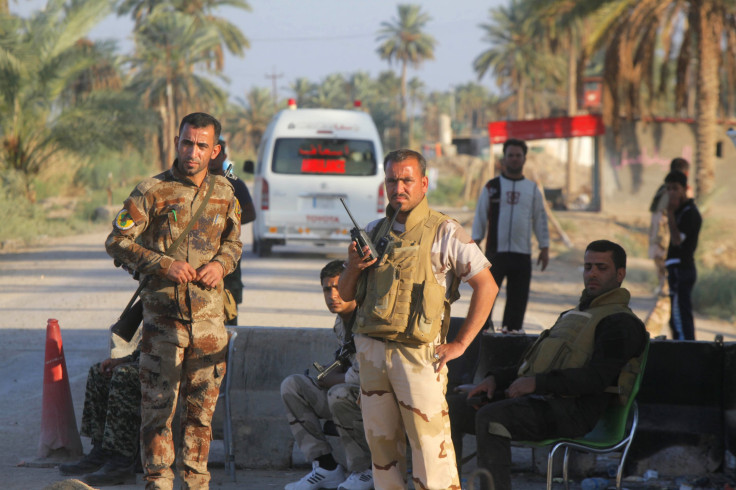Baghdad Residents Fear ISIS Suicide Bombers And Car Bombs, Don't Trust Government Militias

As the Islamic State moves its convoys closer to Baghdad, residents there said the government-backed Shiite militias are teetering and are increasingly unable to protect the capital from the Sunni militants of ISIS. At least 590 people have been killed by car and suicide bombs in Iraq since the beginning of the month, with the majority of attacks occurring in Baghdad in Shiite neighborhoods or at checkpoints armed by Shiite militias, according to Iraq Body Count, a monitoring group tracking civilian deaths.
“Death is all over Baghdad,” Noof Assi, a 25-year-old woman who has lived and worked in Baghdad her entire life, said. “There is no safe place.”
Prime Minister Haider al Abadi has traveled to areas near the capital during the past two weeks to ask local tribesmen to join the fight against ISIS. He specifically asked the fighters to focus on protecting the capital from an ISIS insurgency. Until now, Abadi’s strategy has worked. Militias, the majority of them Shiite, with the support of coalition airstrikes, have been able to stop ISIS by targeting convoys on the roads leading from Anbar, Samara and Fallujah.
Unable to take Baghdad by frontal assault, with advancing fighters supported by tanks, the Sunni militant group has begun waging a new urban warfare with car and suicide bomb attacks. Reminiscent of the al Qaeda tactic- waged during the Iraq War, the car and suicide bombs today are killing civilians. Several of the attacks in the last month have targeted mosques, open markets and large checkpoints.
According to accounts from Baghdad residents, the car and suicide bomb attackers are targeting specific locations in the city. The new targets include the Kadumia and Karrada checkpoints, the neighborhood of Baghdad al-jadeeda and the national theater.
Iraqi police are looking for new ways to keep residents of Baghdad safe. Their answer: more mobile checkpoints. In 2013, there were more than 250 fixed checkpoints in Baghdad and hundreds of other smaller, mobile ones. In total, there are about 1,000 checkpoints in the city. The mobile checkpoints, each consisting of a few dozen armed men, have been set up in neighborhoods across Baghdad, even in those that have not suffered attacks. The increased presence on the streets is an attempt by the Iraqi security forces to detect cars packed with bombs.
Officers manning the posts have so far not been able to detect the cars strapped with bombs, even after they pass through the government scanners. That may be in part because many of them are defective.
In 2013, a jury found Jim McCormick of the U.K. guilty on three counts of fraud after selling millions of dollars worth of fake bomb detectors to the Iraqi government. The detectors were installed at checkpoints in Baghdad through which car bombs and suicide bombers passed. Those detectors are reportedly still in use in Baghdad.
"The checkpoints are doing nothing but causing traffic jams," Assi said. "And the police are harassing people."
The mobile checkpoints, though they were set up to prevent more attacks, are actually often targets. With more and more checkpoints forming across the city, security forces are now at greater risk of being targeted. Not only are security officials at greater risk, but civilians are as well. A 2010 Al Jazeera report found that more than 700 people, including women and children, were killed in Iraq for coming too close to checkpoints.
Assi said the attacks in Baghdad have become so common that the police often do not investigate who is responsible. ISIS has claimed responsibility for several of the attacks in recent weeks, but others could have been launched by different Sunni militants not associated with the Islamic State group.
“It is not only ISIS that is killing people in Iraq. We also have politicians who take their wars from their meeting halls to the streets," Assi said. "We have militias and many armed actors, but I think they are all using ISIS as a cover."
Mia Bloom, a professor at UMass-Lowell and an expert on terrorism, specifically suicide and car bomb attacks, said Baghdad, more than any other city in the region, is prone to the attacks because of its sectarian tensions.
"In Baghdad you have Sunni and Shiite neighborhoods next to each other. That is one of the reasons Baghdad is targeted in a way that is differently than say in Syria. Baghdad is a demographically mixed area," Bloom said. "ISIS has managed to attract former Baathists who were alienated by the Nouri al Maliki regime. ISIS antagonism toward Shiite helps them recruit."
For Assi, the attacks are less about sectarian strife than the inability of the central government to rule effectively. They are just another reminder that Iraq has not made significant strides in stabilizing itself. Four years ago, Assi said, the security situation in Baghdad was similar to what it is today. In 2010, Assi's family was hit by a car bomb attack.
Two cars, each carrying 40 kilograms of TNT, targeted the Iraqi Trade Bank, which at the time was functioning as an army base. One car hit the gate to the bank and the other exploded directly below Assi’s apartment balcony. Her parents, who were both home at the time, endured extensive limb injuries. The only difference between then and now, she said, is the intensity and frequency of the attacks.
© Copyright IBTimes 2024. All rights reserved.





















